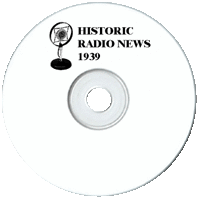

New headlines were dominated by the news Europe from the Spanish Civil War to the Blitzkrieg of Poland.

100 old time radio show recordings
(total playtime 11 hours, 17 min)
available in the following formats:
1 MP3 CD
or
11 Audio CDs
Text on OTRCAT.com ©2001-2026 OTRCAT INC All Rights Reserved. Reproduction is prohibited.


The majority of 1939's radio news was dominated by the coming of War in Europe. For American listeners and their leaders, the important question was how to keep out of the fighting while not giving aid to the enemies of our friends. There would be no easy answer, although the issue would be discussed by politicians and commentators alike.

CBS had well known announcer Bob Trout in New York, and his broadcasts often called upon Edward R. Murrow in London or William Shirer in Berlin. The Columbia network also had the reporting and commentary of H.V. Kaltenborn before 1940. Mutual took advantage of Sigrid Schultz's services. William Shirer would write "No other American correspondent in Berlin knew so much of what was going on behind the scenes as did Sigrid Schultz." NBC broadcast commentary from Dorothy Thompson, "the first lady of American journalism". After the Invasion of Poland, Ms. Thompson was on the air fifteen consecutive days and nights.
Many of our 1939 News Broadcasts come from the BBC. Great Britain and France were to be the two biggest thorns in Hitler's side in the months before invading Poland. Prime Minister Chamberlain's efforts to avoid War are still being debated by historians. Opinions range from too little, too late to a noble, even heroic effort against insurmountable odds.
All of the news services went into overdrive on September 1, 1939, the day that Nazi Germany crossed the border into Poland. England and France immediately declared War on Germany, but little was done militarily for several months.
During the period known as the "Sitzkrieg" or Phoney War, two significant military engagements took place, the Soviet assault on Finland and Battle of the River Plate. Two months after invading Poland, the Soviets expected to roll over the outnumbered and poorly equipped Finns. 
The German pocket battleship Graf Spee had been acting as a commerce raider since the beginning of the War, sinking several merchant vessels in the Indian Ocean and the South Atlantic. A squadron of smaller British ships were sighted by the Spee, but initially believed to be a pair of small destroyers escorting a convoy. Too late the German captain realized he was engaging three British cruisers. The Spee was damaged in the engagement, but not fatally so. She made her way to Montevideo to make repairs. The government of neutral Uruguay informed the Graf Spee that she had to leave port within 72 hours. Unable to effect the necessary repairs in that time, the Captain chose to scuttle his ship rather than face sinking by the British.
Text on OTRCAT.com ©2001-2026 OTRCAT INC All Rights Reserved. Reproduction is prohibited.
You have reached the maximum number of votes for a unregistered user.
Please login or create a new account to continue...
You have reached the maximum number to down votes in this page.



News Recordings 1939 Disc A001
|
Add Audio CD to Cart - $5.00 |
News Recordings 1939 Disc A002
|
Add Audio CD to Cart - $5.00 |
News Recordings 1939 Disc A003
|
Add Audio CD to Cart - $5.00 |
News Recordings 1939 Disc A004
|
Add Audio CD to Cart - $5.00 |
News Recordings 1939 Disc A005
|
Add Audio CD to Cart - $5.00 |
News Recordings 1939 Disc A006
|
Add Audio CD to Cart - $5.00 |
News Recordings 1939 Disc A007
|
Add Audio CD to Cart - $5.00 |
News Recordings 1939 Disc A008
|
Add Audio CD to Cart - $5.00 |
News Recordings 1939 Disc A009
|
Add Audio CD to Cart - $5.00 |
News Recordings 1939 Disc A010
|
Add Audio CD to Cart - $5.00 |
News Recordings 1939 Disc A011
|
Add Audio CD to Cart - $5.00 |
Please wait...
COMMENTS
Paul Verified Purchase
Derek Verified Purchase
Ken Verified Purchase
Leave a comment